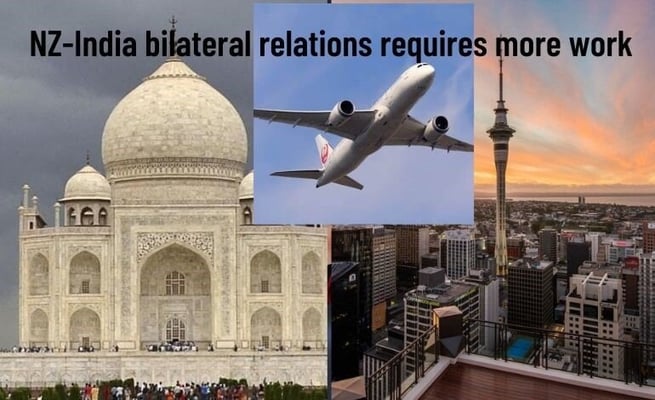NZ-India bilateral relationship needs better political and diplomatic nurturing

There is a sense of unease within the Kiwi-Indian community at the apparent diplomatic ping-pong playing out in the New Zealand-India bilateral relationship around flight bans and travel restrictions imposed by both countries on each other.
Earlier this year, the New Zealand government has, in a historic first, imposed a flight ban from India, thereby stopping even New Zealand citizens from entering the country after India was ravaged by a spike in Covid-19 infections.
Subsequently, that decision was amended and replaced with a new ruling that allowed citizens and their immediate families to enter New Zealand while imposing a new, cost-prohibitive requirement on resident visa holders to quarantine for fourteen days in a third Covid-free country.
The decision has resulted in significant pain, inconvenience, financial burden, and the herculean stress of planning their travel through a Covid free third country, on the members of the Kiwi-Indian community only to return to a country that they long thought was their new home.
Just when the New Zealand government finally responded to long advocacy by the community, including this newspaper, and removed India from the "Very High-Risk Category," bringing some smiles back on the travel-deprived Kiwi-Indian community, the Indian government has put New Zealand in "At high risk" category in response to the new Omicron variant of Covid-19 - causing much anxiety within the community.
Indeed, the requirements imposed on travel by the Indian government's "at-risk" category cause far-less inconvenience, less cost-escalation as compared to what travellers from India to New Zealand had experienced in the last eight months.
According to the new guidelines issued by India's Civil Aviation Ministry, the passengers traveling from countries that are categorized as ‘at-risk’ will have to undergo testing on arrival.
If the passengers test positive, their samples will be sent for genomic sequencing, and they will be sent to institutional quarantine.
If they test negative, they will be asked to remain in home quarantine for seven days, following which they will take a test on the 8th day and continue monitoring their health for the next seven days.
The tests for passengers from ‘at-risk’ nations will be self-paid, while the cost of the random tests will be borne by the Civil Aviation Ministry.
The government authorities on both sides, when probed about the human-miseries such travel restrictions cause, maintain the usual diplomatic stance, putting their respective national interests ahead of any other interests.
However, the Kiwi-Indian community – a migrant community that usually has its heart and soul stretched across the two nations with strong roots and connections in both, does not find any solace in such diplomatic responses.
They rather want a proactive, pre-emptive, behind-the-scenes diplomacy and the political camaraderie between the two governments to prevent such seemingly punitive or knee-jerk travel restrictions.
There is a sense of intrigue within the Kiwi-Indian community about the fact that Australia could escape India's "At-risk" category, despite four known Omicron cases at the time of the announcement, while New Zealand was included in the list despite no known Omicron cases.
Indeed, there seems to be more in play than what meets the eye that suggests the bilateral relationship is missing out on the special political nurturing that is required – from both sides, especially at times like these.
Currently, there seems to be disillusionment within the Kiwi-Indian community – and the community expects more and better - from both governments.
In an important bilateral relationship letting Covid to play disruptor at any disproportionate scale should be eschewed at all cost.
There is a sense of unease within the Kiwi-Indian community at the apparent diplomatic ping-pong playing out in the New Zealand-India bilateral relationship around flight bans and travel restrictions imposed by both countries on each other.
Earlier this year, the New Zealand government has, in a...
There is a sense of unease within the Kiwi-Indian community at the apparent diplomatic ping-pong playing out in the New Zealand-India bilateral relationship around flight bans and travel restrictions imposed by both countries on each other.
Earlier this year, the New Zealand government has, in a historic first, imposed a flight ban from India, thereby stopping even New Zealand citizens from entering the country after India was ravaged by a spike in Covid-19 infections.
Subsequently, that decision was amended and replaced with a new ruling that allowed citizens and their immediate families to enter New Zealand while imposing a new, cost-prohibitive requirement on resident visa holders to quarantine for fourteen days in a third Covid-free country.
The decision has resulted in significant pain, inconvenience, financial burden, and the herculean stress of planning their travel through a Covid free third country, on the members of the Kiwi-Indian community only to return to a country that they long thought was their new home.
Just when the New Zealand government finally responded to long advocacy by the community, including this newspaper, and removed India from the "Very High-Risk Category," bringing some smiles back on the travel-deprived Kiwi-Indian community, the Indian government has put New Zealand in "At high risk" category in response to the new Omicron variant of Covid-19 - causing much anxiety within the community.
Indeed, the requirements imposed on travel by the Indian government's "at-risk" category cause far-less inconvenience, less cost-escalation as compared to what travellers from India to New Zealand had experienced in the last eight months.
According to the new guidelines issued by India's Civil Aviation Ministry, the passengers traveling from countries that are categorized as ‘at-risk’ will have to undergo testing on arrival.
If the passengers test positive, their samples will be sent for genomic sequencing, and they will be sent to institutional quarantine.
If they test negative, they will be asked to remain in home quarantine for seven days, following which they will take a test on the 8th day and continue monitoring their health for the next seven days.
The tests for passengers from ‘at-risk’ nations will be self-paid, while the cost of the random tests will be borne by the Civil Aviation Ministry.
The government authorities on both sides, when probed about the human-miseries such travel restrictions cause, maintain the usual diplomatic stance, putting their respective national interests ahead of any other interests.
However, the Kiwi-Indian community – a migrant community that usually has its heart and soul stretched across the two nations with strong roots and connections in both, does not find any solace in such diplomatic responses.
They rather want a proactive, pre-emptive, behind-the-scenes diplomacy and the political camaraderie between the two governments to prevent such seemingly punitive or knee-jerk travel restrictions.
There is a sense of intrigue within the Kiwi-Indian community about the fact that Australia could escape India's "At-risk" category, despite four known Omicron cases at the time of the announcement, while New Zealand was included in the list despite no known Omicron cases.
Indeed, there seems to be more in play than what meets the eye that suggests the bilateral relationship is missing out on the special political nurturing that is required – from both sides, especially at times like these.
Currently, there seems to be disillusionment within the Kiwi-Indian community – and the community expects more and better - from both governments.
In an important bilateral relationship letting Covid to play disruptor at any disproportionate scale should be eschewed at all cost.









Leave a Comment